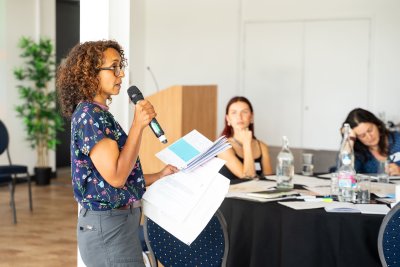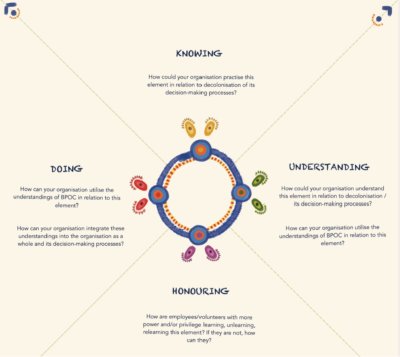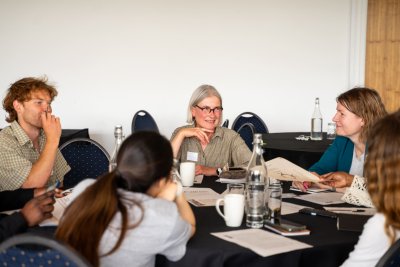
I felt privileged to co-facilitate a 'Decolonial decision-making' workshop at the Gathering Table Summit, with Diana Garduño Jiménez (Nourish Scotland), aiming to address:
- What does decolonisation mean in the context of our organisations and communities?
- How can we incorporate decolonial practices into decision-making processes?

To begin to answer these questions, we took a participatory and interactive approach using applied learnings from Indigenous Canadian activist scholar Andrea Menard’s key elements of decolonisation, to enable participants to:
- Share ideas of what a decolonial organisation is and what decision making within it meant to them.
- Draw upon how their ideas can be applied to settings they work in/with e.g. a community growing space, a commercial food growing/production space, an NGO advocating for a more sustainable food system.
Why was this workshop relevant to the Gathering Table Summit?
Having co-authored the book ‘Reclaiming Economics for Future Generations’ which called to diversify, decolonise and democratise economics and economic systems (with the food system being a key one), this workshop unpacked specific parts of those '3-Ds' in relation to food organisations and decision-making within them.
I also developed the ongoing Pathways to Land for BPOC project with Jo Kamal and Pauline Shakespeare, who work on farming and food justice issues. Pathways identifies some of the financial and other barriers to access land Black and People of Colour face on which to farm and/or establish community food growing spaces, as well as recommendations to help address them. These challenges are a key roadblock to furthering food justice, with many of their root causes stemming from land enclosures and extractive food systems expanded through European colonialism.

The workshop addressed the topics of decolonial organisations and decision-making within them through asking participants:
- What is meant by decolonial food and farming-related work at the organisation and community levels we are a part of and/or engage with?
- What changes do you think must be instilled and processes utilised by organisations we work for/with to ensure decisions made related to our food/farming work are decolonial?
Key takeaways from the workshop
- A theme of emerged of changing workplace composition to help it move away solely from an Equity, Diversity and Inclusion (EDI)approach, to ensure this is embedded throughout all decision-making processes within an organisation e.g. the need for more underrepresented people to have greater influence within it, who may also bring alternative, non-Western knowledge systems to decision-making processes i.e. decolonial education.
- Developing policy, project, and campaign proposals in partnership with Global Majority Heritage groups, rather than develop them first, then consult and engage with such groups afterwards.
- Linking learnings from decolonial education into the 'purpose' of the organisation - it shouldn’t just be an add-on.
- Core/unrestricted funding is needed to develop the above approaches as they are processes which progress over a significant amount of time, so should not be tied to short-term outputs and impacts.

Inevitably, more questions and actions emerged in this workshop about decolonising food organisations and decision making within them, which myself and Pathways colleagues will begin to address through funding we’ve recently been granted.
Further reading and get involved
If you are working on justice issues and are are interested in joining our food and racial justice working work, please fill in this form.
- Connect with Nicola
- The elements of a decolonial organisation handout.
- Read our overview of the whole summit
- Read the opening story
- Learn about the allyship and solidarity session
- Read about embodying the power of food indentities
Follow us over the coming weeks as we publish deeper dives into the sessions and share resources, reflections, and ways to get involved.



